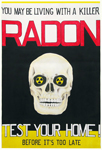Radon
Kids, Students and Teachers
Want to learn about the environment? Want to share what you know with someone else? With fact-sheets, interactive games, and more, Check out EPA's Students for the Environment page at www.epa.gov/students for other kid-friendly information about the environment.
Global Warming - Global warming refers to an average increase in the Earth's temperature, which in turn causes changes in climate. A warmer Earth may lead to changes in rainfall patterns, a rise in sea level, and a wide range of impacts on plants, wildlife, and humans. When scientists talk about the issue of climate change, their concern is about global warming caused by human activities.
Visit EPA's Office of Children's Health Protection (OCHP) - http://yosemite.epa.gov/ochp/ochpweb.nsf/content/homepage.htm
The following sites are useful resources to help children, students and teachers learn more about radon. If you know of other resources we might feature here, please write to us.
Pennsylvania - A fun Pennsylvania kids page with lively graphics; an excellent science information resource for kids on topics such as: news, games, recycling, videos, free stuff and teachers’ resources.
Alabama - Prepared by the state of Alabama, this is a useful tutorial which teaches what radon is, why it is harmful and uses many visual aids.
Kansas - Radon gas can be a wonderful topic for student science fair projects. Many of the projects can be done in a multi-layer or three-dimensional format. Students who complete a radon science fair project can send a summary (found via this link:
http://sosradon.org/sites/sosradon.org/files/ScienceFairSummary.doc
![]() ) to Kansas State University and receive a Certificate of Participation. Learn more at
http://sosradon.org/science-fair-project
) to Kansas State University and receive a Certificate of Participation. Learn more at
http://sosradon.org/science-fair-project
![]()
Teacher Resources
New Jersey - Developed by the state of New Jersey Department of Environmental Protection, this website has top notch lesson plans complete with teacher notes for each lesson and New Jersey teaching standards to accompany each lesson objective.
Disclaimer: Some of the links that are provided here were created by and are maintained by other public and private organizations. Please be aware that we do not control or guarantee the accuracy, relevance, timeliness, or completeness of this outside information. Further, the inclusion of pointers to particular items in hypertext is not intended to reflect their importance, nor is it intended to endorse any views expressed or products or services offered by the author of the reference or the organization operating the server on which the reference is maintained.
2012 National Radon Poster Contest Winners Announced!
Read more about the annual national radon poster contest.
Read 2nd place winner Hayden's Blog "Winning with Radon" at
https://blog.epa.gov/students
Test Your Home for Radon — It's Easy and Inexpensive
The U.S. Surgeon General and EPA recommend that all homes be tested. Read about radon health risks.
Fix your home if you have a radon level of 4 pCi/L or more.
You can test your home yourself or hire a professional.
Find a radon service professional near you.
If you have further questions about Radon, please call your State Radon Contact.
| Read "A Citizen's Guide To Radon: The Guide to Protecting Yourself and Your Family from Radon |
| Buying or Selling a Home? Read the "Home Buyer's and Seller's Guide to Radon" |
| Read A Consumer's Guide to Radon Reduction: How to Fix Your Home |

